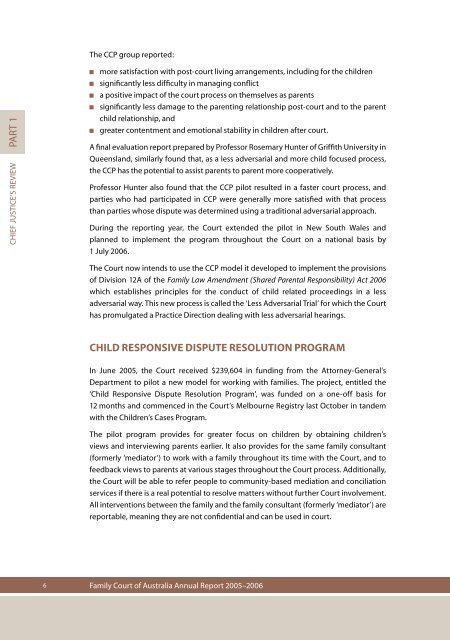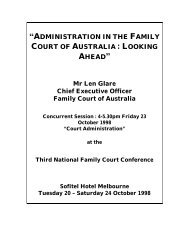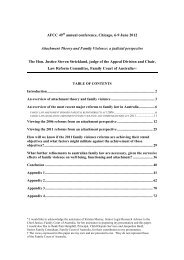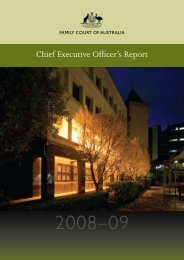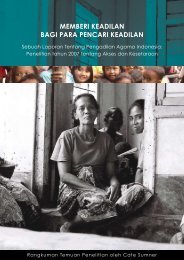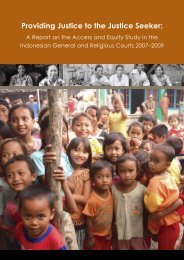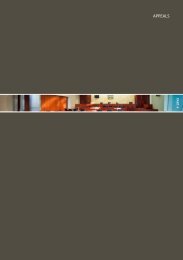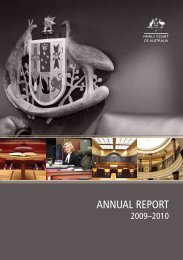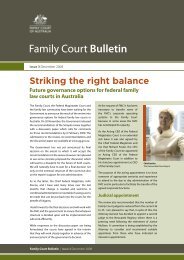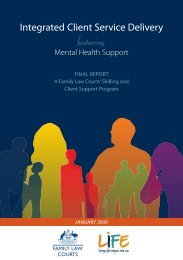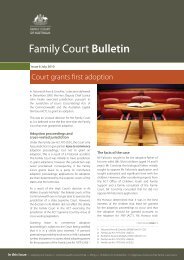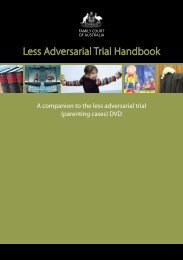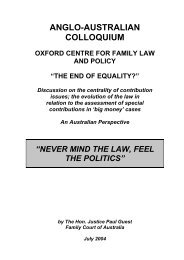View a full copy of this report (PDF Size - 3.69 MB) - Family Court of ...
View a full copy of this report (PDF Size - 3.69 MB) - Family Court of ...
View a full copy of this report (PDF Size - 3.69 MB) - Family Court of ...
You also want an ePaper? Increase the reach of your titles
YUMPU automatically turns print PDFs into web optimized ePapers that Google loves.
The CCP group <strong>report</strong>ed:<br />
Chief Justice’s review Part 1<br />
more satisfaction with post-court living arrangements, including for the children<br />
significantly less difficulty in managing conflict<br />
a positive impact <strong>of</strong> the court process on themselves as parents<br />
significantly less damage to the parenting relationship post-court and to the parent<br />
child relationship, and<br />
greater contentment and emotional stability in children after court.<br />
A final evaluation <strong>report</strong> prepared by Pr<strong>of</strong>essor Rosemary Hunter <strong>of</strong> Griffith University in<br />
Queensland, similarly found that, as a less adversarial and more child focused process,<br />
the CCP has the potential to assist parents to parent more cooperatively.<br />
Pr<strong>of</strong>essor Hunter also found that the CCP pilot resulted in a faster court process, and<br />
parties who had participated in CCP were generally more satisfied with that process<br />
than parties whose dispute was determined using a traditional adversarial approach.<br />
During the <strong>report</strong>ing year, the <strong>Court</strong> extended the pilot in New South Wales and<br />
planned to implement the program throughout the <strong>Court</strong> on a national basis by<br />
1 July 2006.<br />
The <strong>Court</strong> now intends to use the CCP model it developed to implement the provisions<br />
<strong>of</strong> Division 12A <strong>of</strong> the <strong>Family</strong> Law Amendment (Shared Parental Responsibility) Act 2006<br />
which establishes principles for the conduct <strong>of</strong> child related proceedings in a less<br />
adversarial way. This new process is called the ‘Less Adversarial Trial’ for which the <strong>Court</strong><br />
has promulgated a Practice Direction dealing with less adversarial hearings.<br />
Child Responsive Dispute Resolution Program<br />
In June 2005, the <strong>Court</strong> received $239,604 in funding from the Attorney-General’s<br />
Department to pilot a new model for working with families. The project, entitled the<br />
‘Child Responsive Dispute Resolution Program’, was funded on a one-<strong>of</strong>f basis for<br />
12 months and commenced in the <strong>Court</strong>’s Melbourne Registry last October in tandem<br />
with the Children’s Cases Program.<br />
The pilot program provides for greater focus on children by obtaining children’s<br />
views and interviewing parents earlier. It also provides for the same family consultant<br />
(formerly ‘mediator’) to work with a family throughout its time with the <strong>Court</strong>, and to<br />
feedback views to parents at various stages throughout the <strong>Court</strong> process. Additionally,<br />
the <strong>Court</strong> will be able to refer people to community-based mediation and conciliation<br />
services if there is a real potential to resolve matters without further <strong>Court</strong> involvement.<br />
All interventions between the family and the family consultant (formerly ‘mediator’) are<br />
<strong>report</strong>able, meaning they are not confidential and can be used in court.<br />
<br />
<strong>Family</strong> <strong>Court</strong> <strong>of</strong> Australia Annual Report 2005–2006


